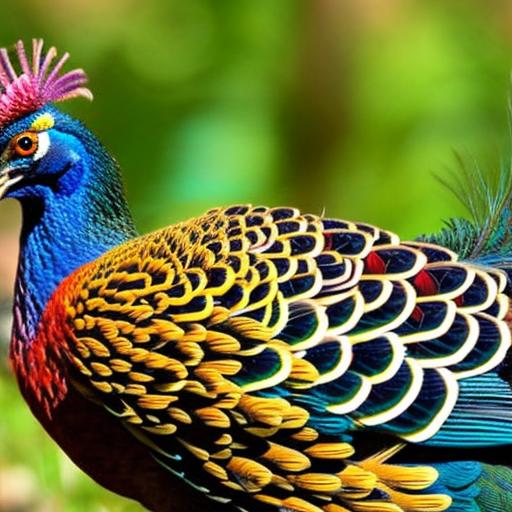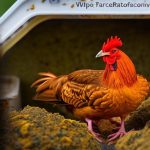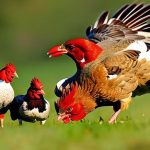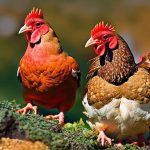Chickens and peacocks are two of the most common birds kept in backyard farms. While they may seem like an odd pairing, they can actually coexist peacefully. In this blog post, we’ll explore the differences between chickens and peacocks, the benefits of keeping them together, and the factors to consider before doing so.
Key Takeaways
- Chickens and peacocks can be compatible if introduced properly.
- Chickens and peacocks have different behaviors and habitat preferences.
- Keeping chickens and peacocks together can provide benefits such as pest control and entertainment.
- Factors such as space, predator protection, and social dynamics should be considered before keeping them together.
- Adequate housing, feeding, and health care are important for both chickens and peacocks.
Differences between Chickens and Peacocks in Terms of Behavior and Habitat
Chickens are social animals that thrive in groups, while peacocks are solitary creatures. Chickens prefer to stay on the ground, scratching and pecking for food. They are known for their docile nature and are relatively easy to handle. On the other hand, peacocks are known for their vibrant plumage and prefer to perch on trees and high places. They are more territorial and can be aggressive towards other birds.
In terms of habitat, chickens are typically kept in coops with nesting boxes and roosting bars. They require a secure and protected area to lay their eggs and sleep at night. Peacocks, on the other hand, need a sheltered area with perches where they can roost. They prefer open spaces where they can display their beautiful feathers.
Benefits of Keeping Chickens and Peacocks Together
One of the benefits of keeping chickens and peacocks together is that they can help control pests in the garden. Chickens are natural foragers and will eat insects, slugs, and other pests that may damage your plants. Peacocks also eat insects, including ticks, which can be beneficial for tick control in your backyard.
Another benefit is the entertainment and beauty they bring to your backyard farm. Chickens have their own unique personalities and can be quite entertaining to watch as they scratch around and interact with each other. Peacocks, with their stunning plumage and elaborate courtship displays, can be a beautiful addition to your backyard.
Keeping chickens and peacocks together can also save space and resources. Instead of having separate enclosures for each bird, you can provide a shared space where they can coexist. This can be especially beneficial if you have a small backyard or limited resources.
Factors to Consider Before Keeping Chickens and Peacocks Together
Before deciding to keep chickens and peacocks together, there are several factors to consider. First, make sure to check your local laws and regulations regarding the keeping of these birds. Some areas may have restrictions or require permits for keeping certain types of birds.
Next, consider the size of your backyard and the number of birds you want to keep. Chickens and peacocks both require space to roam and exercise. Make sure you have enough room to accommodate their needs and prevent overcrowding.
Another factor to consider is the noise level. Peacocks are known for their loud calls, especially during mating season. If you have close neighbors or live in an urban area, this may be a concern. Additionally, consider the potential for conflicts between the birds. Peacocks can be territorial and may try to dominate the chickens. It’s important to monitor their interactions and provide enough space and resources to reduce conflicts.
Housing Requirements for Chickens and Peacocks
Chickens and peacocks have different housing needs. Chickens require a coop with nesting boxes and roosting bars. The coop should be secure and protected from predators such as raccoons or foxes. It should also have proper ventilation to prevent moisture buildup.
Peacocks, on the other hand, need a sheltered area with perches where they can roost. They prefer open spaces where they can display their feathers, so make sure there is enough room for them to move around comfortably.
Regardless of the type of bird, it’s important to provide a clean and dry environment. Regularly clean the coop or shelter and remove any droppings or debris. This will help prevent the spread of diseases and parasites.
Feeding and Nutrition for Chickens and Peacocks

Chickens and peacocks have different dietary requirements. Chickens need a balanced diet of grains, protein, and calcium. They can be fed a commercial chicken feed or a mixture of grains such as corn, wheat, and oats. It’s also important to provide them with access to fresh water and clean feeders.
Peacocks, on the other hand, require a higher protein diet. They can be fed a game bird feed or a mixture of grains and high-protein pellets. It’s important to provide them with enough protein to support their growth and feather development.
Regardless of the type of bird, it’s important to provide fresh water at all times. Make sure to clean the waterers regularly to prevent the buildup of bacteria.
Health Concerns for Chickens and Peacocks
Chickens and peacocks can be susceptible to different diseases and parasites. It’s important to provide regular veterinary care and monitor the birds for any signs of illness or injury.
Common health concerns for chickens include respiratory infections, mites or lice infestations, and egg-laying issues. Peacocks can also be susceptible to respiratory infections as well as parasites such as ticks or fleas.
To prevent the spread of diseases, make sure to quarantine any new birds before introducing them to your existing flock. Keep the housing clean and dry, as moisture can promote the growth of bacteria or fungi.
Social Dynamics between Chickens and Peacocks
Both chickens and peacocks have their own social dynamics within their group. Chickens establish a pecking order, where each bird has its place in the hierarchy. This can sometimes lead to aggression or bullying, especially when introducing new birds to an existing flock.
Peacocks, on the other hand, may try to dominate the chickens due to their territorial nature. It’s important to monitor their interactions and intervene if necessary. Providing enough space and resources can help reduce conflicts between the birds.
Tips for Successful Integration of Chickens and Peacocks
If you decide to keep chickens and peacocks together, it’s important to introduce them gradually and monitor their interactions. Start by keeping them in separate enclosures within sight of each other. This will allow them to get used to each other’s presence without direct contact.
Once they seem comfortable, you can start introducing them in a controlled environment. Make sure to provide separate feeding and watering stations to prevent competition. Also, make sure there are enough perches and hiding places for the birds to escape if needed.
Weighing the Pros and Cons of Keeping Chickens and Peacocks Together
Keeping chickens and peacocks together can be a rewarding experience. They can help control pests in the garden, provide entertainment and beauty, and save space and resources. However, it’s important to consider the factors involved and make sure you’re prepared for the responsibility.
With proper care and attention, these birds can coexist peacefully and provide joy to your backyard farm. Just make sure to provide appropriate housing, feed them a balanced diet, monitor their health, and manage their social dynamics. By doing so, you can create a harmonious environment where chickens and peacocks thrive together.
If you’re considering keeping chickens and peacocks together, it’s important to understand their compatibility and the necessary accommodations. While chickens and peacocks can coexist peacefully, there are certain factors to consider. In a related article on Poultry Wizard, you can learn more about the topic and discover helpful tips for successfully keeping these two species together. The article provides insights into the ideal coop setup, feeding requirements, and potential challenges that may arise. To find out more, check out the article here.
FAQs
What are the basic requirements for keeping chickens and peacocks together?
To keep chickens and peacocks together, you need a spacious and secure coop or enclosure that provides enough space for both species to move around freely. You also need to ensure that the coop has separate nesting boxes and perches for each species.
What are the benefits of keeping chickens and peacocks together?
Keeping chickens and peacocks together can be beneficial as they can help each other in various ways. Chickens can help keep the coop clean by eating insects and pests, while peacocks can help protect the flock from predators with their loud calls and alertness.
What are the potential problems of keeping chickens and peacocks together?
One potential problem of keeping chickens and peacocks together is that they have different dietary requirements. Chickens require a diet that is high in protein, while peacocks require a diet that is high in fiber. Another potential problem is that peacocks can be aggressive towards chickens, especially during mating season.
How can you prevent aggression between chickens and peacocks?
To prevent aggression between chickens and peacocks, you need to ensure that they have enough space to move around freely and that they have separate nesting boxes and perches. You can also provide them with separate feeding areas to prevent competition for food.
What are the legal requirements for keeping chickens and peacocks together?
The legal requirements for keeping chickens and peacocks together vary depending on your location. In some areas, you may need a permit or license to keep these animals, while in others, there may be restrictions on the number of animals you can keep. It is important to check with your local authorities before keeping chickens and peacocks together.
Meet Walter, the feathered-friend fanatic of Florida! Nestled in the sunshine state, Walter struts through life with his feathered companions, clucking his way to happiness. With a coop that’s fancier than a five-star hotel, he’s the Don Juan of the chicken world. When he’s not teaching his hens to do the cha-cha, you’ll find him in a heated debate with his prized rooster, Sir Clucks-a-Lot. Walter’s poultry passion is no yolk; he’s the sunny-side-up guy you never knew you needed in your flock of friends!







